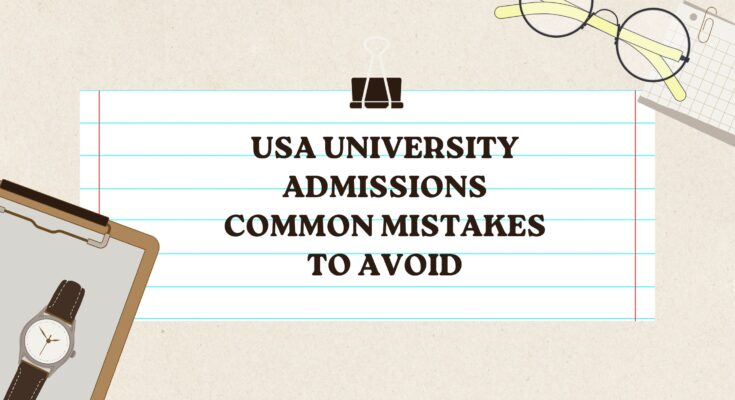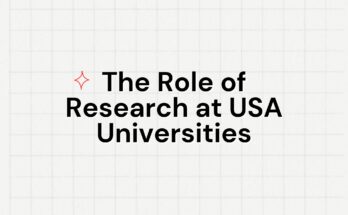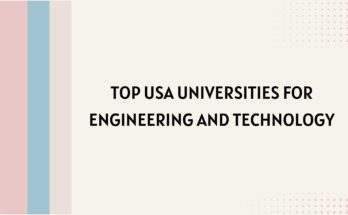The journey to applying for universities in the United States can be both exhilarating and daunting. With thousands of institutions to choose from, each with its unique criteria and expectations, navigating the admissions process requires careful planning and attention to detail. Whether you’re a high school student aiming to study abroad or a prospective graduate student looking to further your education, avoiding common pitfalls can significantly enhance your chances of success. Here are some crucial mistakes to steer clear of when applying to US universities:
USA University Admissions: Common Mistakes to Avoid
1. Procrastination in Preparation:
One of the most common errors applicants make is underestimating the time and effort required for thorough preparation. From researching suitable universities to gathering required documents and preparing for standardized tests like the SAT or GRE, starting early is key. Rushing through applications often leads to overlooked details and missed opportunities for improvement.
2. Ignoring Fit and Research:
Each university has its own culture, strengths, and specialties. Failing to research and understand these aspects can result in applying to institutions that may not align with your academic goals or personal preferences. Take the time to explore university websites, attend virtual or in-person campus tours if possible, and connect with current students or alumni to get a deeper insight into the university’s environment.
3. Incomplete or Inaccurate Applications:
Detailed and accurate applications are crucial for making a positive impression on admissions committees. Missing deadlines, omitting required documents such as transcripts or recommendation letters, or providing incorrect information can lead to your application being disqualified or delayed. Create a checklist for each application to ensure all components are complete and error-free.
4. Lack of Personalization in Essays:
Essays and personal statements offer an opportunity to showcase your personality, experiences, and aspirations beyond your academic achievements. Generic essays that lack personalization or do not directly address the prompts provided can weaken your application. Tailor each essay to the specific university and program you are applying to, highlighting how your background and goals align with their values and offerings.
5. Overlooking Financial Aid and Scholarships:
The cost of education in the US can be substantial, and many universities offer financial aid and scholarship opportunities to help offset expenses. Failing to research and apply for these opportunities early in the process could limit your options or result in missed funding opportunities. Explore both merit-based and need-based aid options offered by universities, external organizations, and government agencies.
6. Neglecting Standardized Test Preparation:
Standardized tests such as the SAT, ACT, GRE, or TOEFL/IELTS for international students play a significant role in admissions decisions for many US universities. Poor preparation or underestimating the importance of these tests can negatively impact your application. Invest time in understanding the test format, practicing with sample questions, and if necessary, consider enrolling in test preparation courses to improve your scores.
7. Not Seeking Guidance or Feedback:
Navigating the complexities of US university admissions can be challenging, especially for international students or those unfamiliar with the process. Avoid the mistake of not seeking guidance from school counselors, mentors, or admissions consultants who can provide valuable insights and feedback on your application materials. Peer review of essays and applications can also help identify areas for improvement.
8. Underestimating Extracurricular Activities:
While academic achievements are important, US universities also value a well-rounded applicant who has demonstrated interests and achievements outside of the classroom. Participation in extracurricular activities such as sports, clubs, community service, or leadership roles can strengthen your application and showcase your ability to balance academics with other interests.
9. Ignoring Demonstrated Interest:
Many universities track demonstrated interest, which includes interactions such as campus visits, interviews, or attending information sessions. Demonstrating genuine interest in the university through these activities can positively influence admissions decisions. If possible, engage with admissions representatives, attend virtual events, and ask thoughtful questions to demonstrate your enthusiasm for the institution.
10. Overlooking Application Deadlines:
Missing application deadlines is perhaps one of the costliest mistakes an applicant can make. US universities adhere strictly to their deadlines, and late applications are typically not considered. Use calendars, reminders, and organizational tools to stay informed about application deadlines for each university and program you are applying to, including deadlines for financial aid and scholarships.
Conclusion
Navigating the admissions process for US universities requires careful planning, attention to detail, and proactive engagement. By avoiding these common mistakes and approaching each application with thorough research and preparation, you can enhance your chances of securing admission to the institution of your choice. Remember, the admissions process is not just about showcasing your academic achievements but also about demonstrating your fit for the university and your potential to contribute positively to its community. Good luck on your journey to higher education in the United States!



